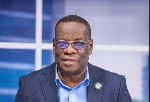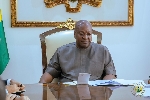Razak Kojo Opoku analyses base pay trends from 2023 to 2026, urges labour to seek mid-year review if economic stability falters
 Dr Razak Kojo Opoku
Dr Razak Kojo Opoku
Policy analyst and economist, Dr. Razak Kojo Opoku, has released an in-depth analysis comparing Ghana’s base pay negotiations from 2023 to 2026, describing the latest agreements under the Mahama administration as fair and reflective of improved economic stability.
In his report titled “Fair to the Facts: Base Pay Negotiations from 2023–2026,” Dr. Opoku examined trends in base pay adjustments against inflation and exchange rate performance over the four-year period, offering what he described as an “objective and non-partisan” assessment.
2023 and 2024 Under Akufo-AddoAccording to Dr. Opoku, the 30% base pay increase in 2023 was “extremely poor” for Organised Labour, considering that inflation averaged 53.6% in January and 23.2% in December 2023.
He noted that despite labour’s proposal for a 60% increment, the government settled on 30%, which represented a 30% shortfall from labour’s demand.
For 2024, he said base pay increased by 23% from January to June and 25% from July to December, with inflation hovering around 23.5% to 23.8%.
While describing the 2024 base pay as “moderately okay,” he noted that “poor exchange rate trends and the domestic debt exchange programme (‘haircuts’) weakened the overall benefit to workers.”
2025 and 2026 Under MahamaDr. Opoku said the 10% base pay for 2025 was “very good” for Organised Labour due to Ghana’s economic recovery, citing falling inflation from 23.5% in January to around 8% currently, and a “favourable exchange rate environment.”
He highlighted that labour initially proposed a 50% increase, but the Mahama-led government settled on 10%, a reduction of 40%, which he said was “reasonable under the current macroeconomic stability.”
Touching on the 2026 base pay, which stands at 9%, Dr. Opoku argued that it remains “a good deal” if the government’s projections of single-digit inflation and a stable exchange rate between GHS9 and GHS11 per US dollar hold true. Organised Labour had proposed 15%, with the government agreeing to 9%, a difference of 6%.
Comparative AssessmentSumming up his analysis, Dr. Opoku stated:“Based on the economic indicators and general market conditions, the 10% base pay in 2025 is better than the 30% in 2023, and the 9% for 2026 is also better than the 25% for 2024.”
Call for VigilanceDr. Opoku advised Organised Labour to seek renegotiation before the mid-year budget review if the government fails to maintain single-digit inflation and exchange rate stability between January and June 2026.
“This is an objective and non-partisan analysis,” he emphasised, urging all stakeholders to assess the figures based on prevailing economic realities rather than political sentiments.
The base pay negotiations form a central part of Ghana’s public sector wage policy, influencing the overall cost of living and labour relations between the government and worker unions.
Source: Classfmonline.com/Cecil Mensah
Trending News

'Commercial farming is Ghana’s future': Ayariga bemoans multibillion-dollar drain, warns against dependence on imports
17:44
OSP rejects Martin Kpebu’s claims of “Self-Investigation,” describes allegations as misleading
07:14
Kwabena Agyepong's campaign manager endorses Bawumia ahead of NPP presidential primary
07:38
Accra Mayor preps city for Christmas, leads sanitation and beautification drive
19:41
WAEC exec outlines skills gap causing decline in math performance
23:39
Nungua Stool defends government board appointee Ben Danso amid land dispute
17:38
Ofankor-Nsawam-Kumasi road: President Mahama pleased with 'rapid progress' after last visit 90 days ago, anticipates April 2026 finish
01:17
Minority demands prosecution over alleged GHS10m overspending at Transport Ministry
08:33
Ablekuma West MP secures jobs for constituents through targeted lobbying efforts
09:36
Ghana AIDS Commission reaffirms commitment to ending HIV epidemic by 2030
10:54



